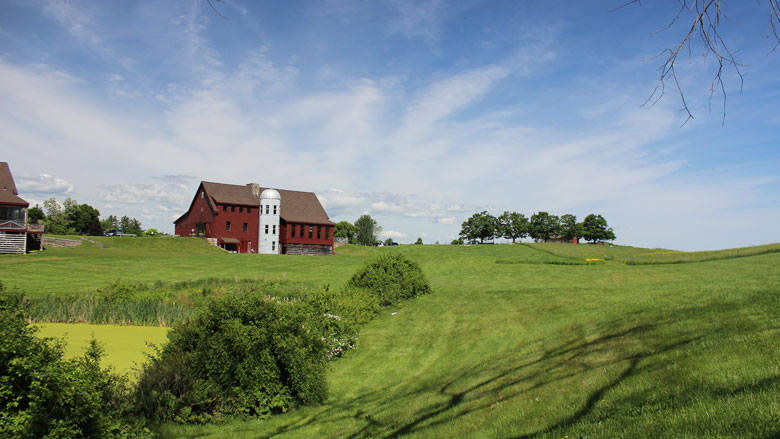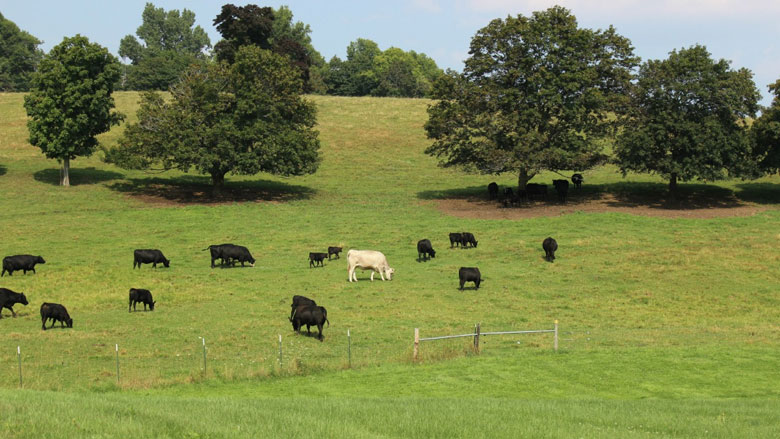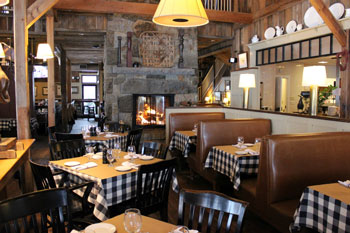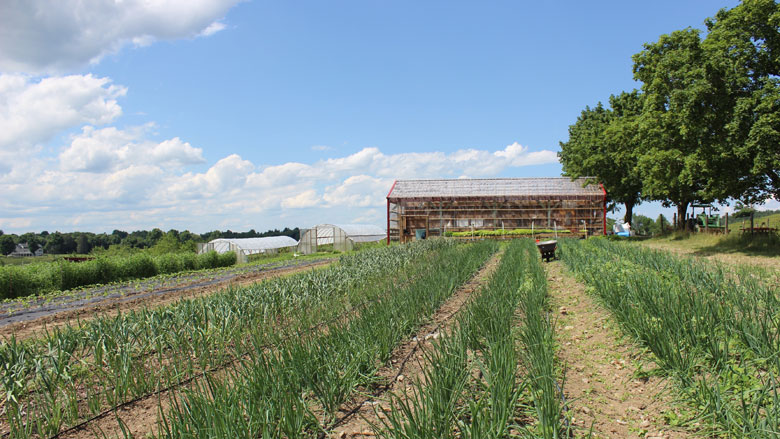Entrepreneurs and conservationists collaborate at Groton’s Gibbet Hill
By Mary McCleary | April 22, 2016, 6:23 EDT
 (Courtesy of Gibbet Hill Grill)
(Courtesy of Gibbet Hill Grill) The verdant pastures of Gibbet Hill in Groton were first settled in 1645. The lush countryside remained virtually untouched for over three centuries. But in 2000, the land narrowly escaped being turned into an unsightly housing development. To avoid the calamity, local investors and conservationists joined forces in a novel solution. The result was a lucrative restaurant business that blends seamlessly into an expansive preservation area.
The Gibbet Hill property is located off of Lowell Street, across from Lawrence Academy. The graceful white house that John Lawrence built in 1690 still marks the entrance. Over the centuries, the land changed hands a number of times, but it always retained a rural character. In 1906, Groton native General William Bancroft, head of Boston Elevated Railroad and mayor of Cambridge, started to build a large retirement home at the top of Gibbet Hill. He modeled his house after a castle, but was unable to complete it when he fell short of funds.
In 1918, a physician named Harold Ayres bought the estate and turned Bancroft’s house into a private sanitarium. In the 1930s, the Groton Hunt Club took over the property for fox-hunting and social events. But a fireworks mishap destroyed the house in 1932. The only part of the structure that survived the fire was a stone tower, which can still be seen today from one of the hiking trails.
The farm was then purchased in 1947 by Marion Campbell, a Washington Post writer whose father was the owner of the Atlantic Monthly. She bred Black Angus cattle on the property until 2000. Much to the chagrin of local residents, Campbell decided to sell the land to a construction company, which had plans to develop 78 houses on the farm.

Gibbet Hill land (Courtesy of Gibbet Hill Grill)
Most of the town’s inhabitants did not wish to see their picturesque rural surroundings destroyed by the development. One resident, Geotel Communications founder Steven Webber, saw an opportunity in the conundrum to launch a profitable venture that would also preserve the local landscape. He bought the 338-acre farm from Campbell, as well as an adjacent 188-acre orchard.
By successfully merging commercial interests with local conservation efforts, the Gibbet Hill operation proves that the two objectives can be combined in a harmonious, symbiotic way.
With the purchase, Webber was able to set up his children (Josh, Jed and Kate) in business. They opened the Gibbet Hill Grill and The Barn at Gibbet Hill on the property.
The Department of Conservation and Recreation worked with the Town of Groton to pay for a conservation restriction that would ensure the land would not be developed in perpetuity. The Webbers worked closely with them, and also donated a small portion of the land to the Groton Conservation Trust, which preserves over 40 sites throughout the town.
Founded in 1964, the Groton Conservation Trust has an impressive history. It is a private, non-profit organization that is run entirely by volunteers. The GCT is responsible for over 1,400 acres of land. Its preservation efforts include facilitating public access with trails, pathways, and footbridges; providing recreational activities; managing invasive species and planting new areas; protecting important habitats, as well as a host of other activities. The trust is governed by an all-volunteer board, and includes scientists, engineers, environmentalists, surveyors, educators, and lawyers among its diverse membership.

Gibbet Hill Grill interior (Courtesy of Gibbet Hill Grill)
While the Department of Conservation and Recreation and the Town of Groton manage the preservation land around Gibbet Hill, the Webber family runs the commercial enterprise. It was a smart business investment that has proved quite successful. Town residents enjoy the pleasant hiking trails, and restaurant patrons come from afar for the idyllic scenery and farm-based cuisine.
The Gibbet Hill Grill features Executive Chef Tom Fosnot, who plans his seasonal menus around the property’s harvest. Fosnot creates weekly farm-to-fork specials according to the produce in season. He works closely with the Gibbet Hill Farm Manager to coordinate the agricultural crops with the restaurant’s culinary needs. The farm grows over 40 varieties of heirloom tomatoes, cucumbers, squash, greens, beets, and other vegetables, along with edible flowers and herbs.
The Webber family also restored a 100-year-old barn on the property, and turned it into a wedding and special events venture. Together with the restaurant, the business enjoys a steady stream of clientele and revenue. By successfully merging commercial interests with local conservation efforts, the Gibbet Hill operation proves that the two objectives can be combined in a harmonious, symbiotic way.

Farm crops for the restaurant (Courtesy of Gibbet Hill Grill)
The Gibbet Hill Trails are located between Lowell Road (route 40) and Martins Pond Road in Groton. Parking is available at the end of the restaurant parking lot until 4 p.m. Other parking locations are available at designated spots. Trails are open until dusk and are marked with green-on-white “Groton Trails Network” signs.
The Gibbet Hill Farm and Grill is open Sunday to Thursday 4 p.m. – 9 p.m. and Friday to Saturday 4 p.m. – 10 p.m. It is located at 61 Lowell Road, Groton, MA 01450.
Contact Mary McCleary at [email protected].
NBPEconomic










